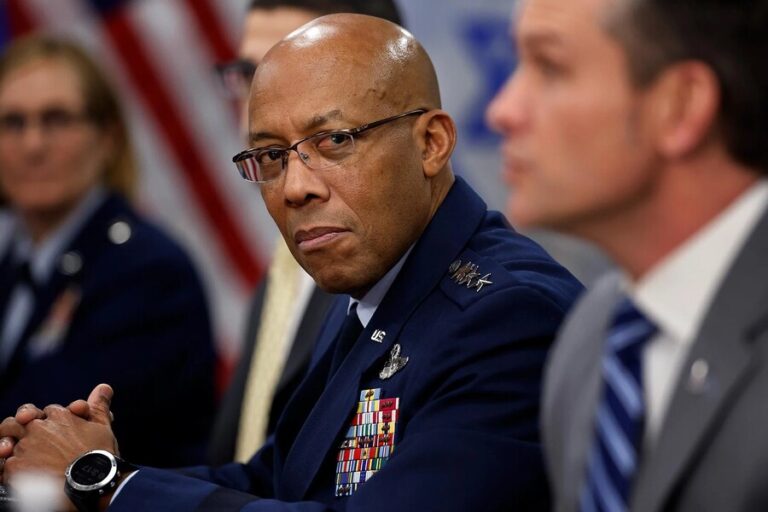In a dramatic overhaul of the nation’s military leadership, President Donald Trump has dismissed Joint Chiefs of Staff Chairman Gen. CQ Brown and several other high-ranking officials, marking one of the most significant shake-ups in recent history. The move, spearheaded by Trump and Defense Secretary Pete Hegseth, targets officers associated with Biden-era policies on diversity, equity, and inclusion (DEI), as well as those involved in the controversial 2021 Afghanistan withdrawal. The administration announced on Friday night that Air Force Lt. Gen. Dan Caine would replace Brown as the highest-ranking military officer in the country. Trump expressed his appreciation for Brown’s service but emphasized the need for new leadership aligned with his vision.
“I want to thank General Charles ‘CQ’ Brown for his over 40 years of service to our country,” Trump posted on social media. “He is a fine gentleman and an outstanding leader, and I wish a great future for him and his family.” Hegseth followed with additional personnel changes, removing Chief of Naval Operations Adm. Lisa Franchetti and Air Force Vice Chief of Staff Gen. James Slife. He also indicated that the Army, Navy, and Air Force’s top legal officers—the judge advocates general—would be replaced. The restructuring immediately sparked backlash from lawmakers. Sen. Jack Reed (D-R.I.) called the firings “a calculated purge of competent military leaders for political reasons.” Reed further warned that such moves could disrupt military operations and morale within the ranks.
Brown, who was appointed by former President Joe Biden, has been a vocal advocate for addressing racial challenges within the military. His dismissal, along with those of other senior officials, has been viewed by some as an effort to eliminate officers with progressive policy leanings. Despite the controversy, the Trump administration has justified the move as a necessary measure to restore focus and operational effectiveness. Speaking at a Pentagon town hall, Hegseth reiterated his opposition to DEI programs, stating, “I think the single dumbest phrase in military history is ‘our diversity is our strength.’ Our strength is our unity and shared history.”
The newly appointed Joint Chiefs chairman, Lt. Gen. Dan Caine, brings a wealth of experience in special operations and counterterrorism. A former CIA associate director, Caine played a crucial role in the fight against ISIS and served as a key strategist for counterterrorism operations. Caine’s military career includes commanding air defenses over Washington, D.C., on September 11, 2001. In a 2023 interview, he recalled his role in ensuring no further hijacked aircraft reached their targets, stating, “I remember telling my wingman, ‘Don’t shoot unless I give the order.’ The consequences of getting that decision wrong would have been catastrophic.” While Caine’s qualifications are widely acknowledged, critics argue that his selection was based on loyalty to Trump rather than experience leading a large, complex military bureaucracy.
The removal of military legal heads adds another layer of uncertainty. The judge advocates general, responsible for overseeing legal policies within the armed forces, play a crucial role in shaping military justice and rules of engagement. Hegseth, who has criticized military lawyers for imposing what he sees as overly restrictive combat rules, made it clear that new leadership would be tasked with reshaping these policies. The now-former Army JAG, Lt. Gen. Joseph Berger III, had only held his position since July 2024. The Air Force’s top attorney, Lt. Gen. Charles Plummer, had been in place since May 2022. Meanwhile, the Navy’s legal leadership was already in flux after Rear Adm. Christopher French resigned unexpectedly in December, leaving the position temporarily filled by Rear Adm. Lia Reynolds.
This restructuring signals a fundamental shift in the U.S. military’s approach under Trump’s leadership. The Pentagon’s newly formed task force, led by Hegseth, is expected to release a report by March 1 detailing additional changes, particularly focusing on the dismantling of Biden-era diversity initiatives. Supporters argue that these firings will help refocus the military on warfighting and readiness. However, critics warn that replacing seasoned leaders with less experienced, politically aligned personnel could weaken national security. The debate over the long-term impact of these decisions is likely to persist as Trump’s second term unfolds.
Rep. Adam Smith (D-Wash.), ranking member of the House Armed Services Committee, condemned the shake-up, calling it the “Friday Night Massacre.” Smith accused Trump of prioritizing loyalty over proven ability, stating, “Once again, the President has chosen fealty over experience and qualifications.” As the dust settles on this unprecedented overhaul, military leaders, lawmakers, and service members alike are left grappling with the implications. Whether this marks the beginning of a new era of military governance or a dangerous politicization of the armed forces remains to be seen.
